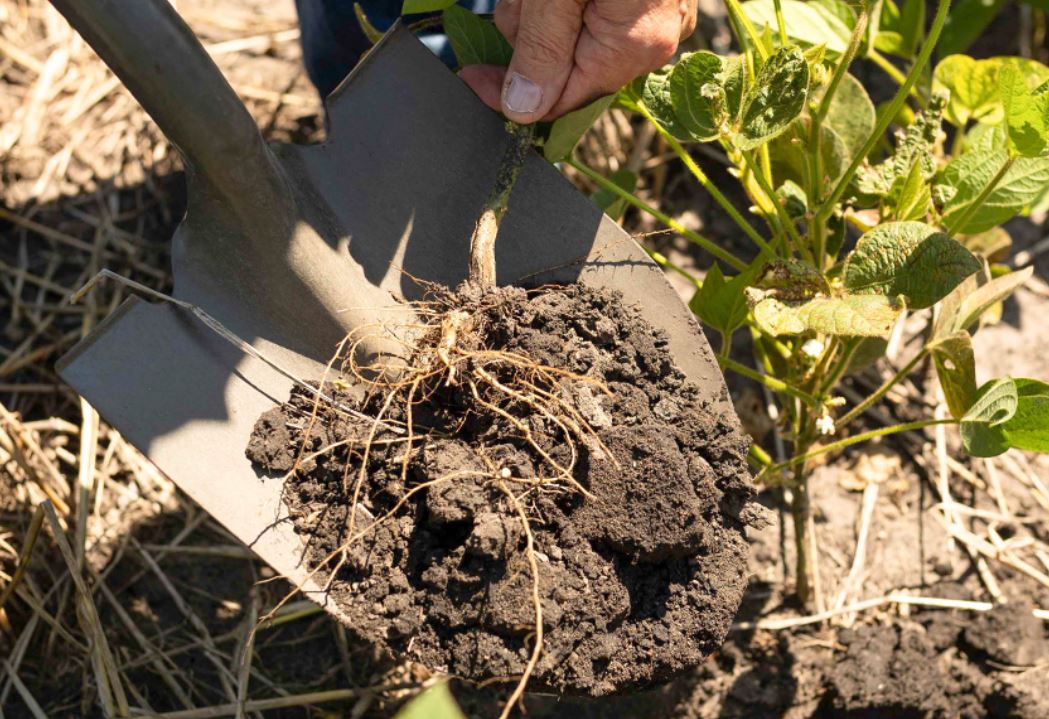
(Photo: Iowa Soybean Association / Joclyn Bushman)
New soybean varieties for 2025 provide farmers with tools to fight SCN
November 7, 2024 | Kriss Nelson
For more than a decade, soybean cyst nematode (SCN) has been robbing yields of $1.5 billion a year, making SCN the most damaging pathogen of soybeans.
In the early 1990s, all SCN-resistant soybean varieties available in Iowa had resistance from a breeding line named PI 88788, and this breeding line was used almost exclusively for 30 years. Growing varieties with PI 88788 SCN resistance for decades caused SCN populations to develop high reproduction on the varieties, leading to significantly reduced soybean yields.
SCN resistance from the breeding line Peking became available in a handful of soybean varieties for Iowa in the 2000s, but these varieties rarely yielded competitively. Since 2021, more high-yielding varieties with Peking SCN resistance have become available, and these varieties not only are very effective in controlling the reproduction of the nematode but also boost yields by up to 20 bushels to the acre over soybean varieties with PI 88788 SCN resistance.
The number of options for Peking SCN-resistant soybean varieties continues to increase and for the 2025 growing season, Iowa farmers now have 200 such varieties in maturity groups 0, I, II and III from which to choose. Each year, Iowa State personnel compile a list of SCN-resistant varieties for use in Iowa. The Iowa Soybean Association supports this effort with soybean checkoff funds, and Iowa State Extension publishes the information in publication CROP1649, available online here.
“I commend the seed companies for being responsive to the needs of Iowa farmers,” says Greg Tylka, Morrill Professor, nematologist and co-director of the Iowa Soybean Research Center at Iowa State University. “But 200 varieties isn’t enough. We need more varieties with Peking SCN resistance, especially in the maturity group III. I hope the seed industry continues to develop and bring to market more of this type of SCN-resistant variety for farmers.”
Although having many more varieties with Peking SCN resistance is good news, Tylka is cautious to celebrate.
“I hope seed companies do not abandon developing soybean varieties with SCN resistance from PI 88788 so Iowa farmers can grow soybeans with both types of resistance. We anticipate Peking to be less durable than PI 88788 because of Peking’s mechanism of resistance.”
Tylka cautions that varieties with Peking SCN resistance could be vulnerable to losing its effectiveness after only four or five uses, if used exclusively.
BASF announced in June what they claim to be the “new standard of nematode management for soybean farmers.” Expected for the 2028 growing season, BASF is releasing a transgenic SCN resistance called Nemasphere. Nemasphere is the first and only biotechnology trait for SCN.
Managing SCN
Although Tylka considers Nemasphere and the new Peking varieties “welcome additions” in the SCN management toolbox, he warns they are not a complete cure for SCN and encourages farmers to monitor the pest through fall soil sampling to understand changes in SCN populations through rotations better.
Although soybeans with Peking SCN resistance likely will produce much higher yields in SCN-infested fields relative to varieties with PI 88788 resistance, enticing farmers to want to grow strictly Peking varieties, it is strongly discouraged.
Prolonged use of Peking SCN resistance will result in SCN populations developing high reproduction levels on Peking resistance genetics, possibly quicker than with PI 88788 resistance. A long-term and economically sustainable approach to maintaining high soybean yields in SCN-infested fields is to alternate growing varieties with Peking SCN resistance and PI 88788 resistance.
“We need farmers to embrace Peking, but to work it into a rotation with PI 88788,” he says. “An ideal rotation would be one year Peking soybeans, second-year corn, third year PI 88788 soybeans, fourth-year corn, then repeat.”
Tylka also encourages farmers to explore the potential benefits of using nematode-protectant seed treatment products in addition to growing SCN-resistant varieties, as the seed treatments could boost yields.
To help pick the best PI 88788 and Peking SCN-resistant varieties, farmers are encouraged to turn results of the ISU SCN-resistant variety trials which are funded by the soybean checkoff.
Back